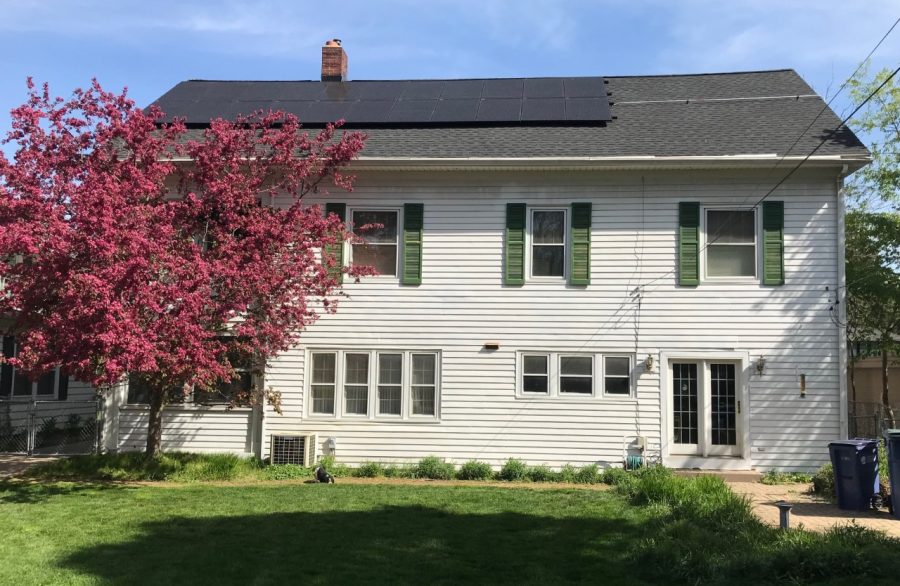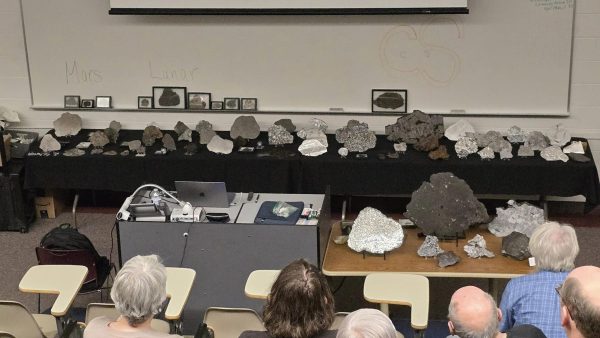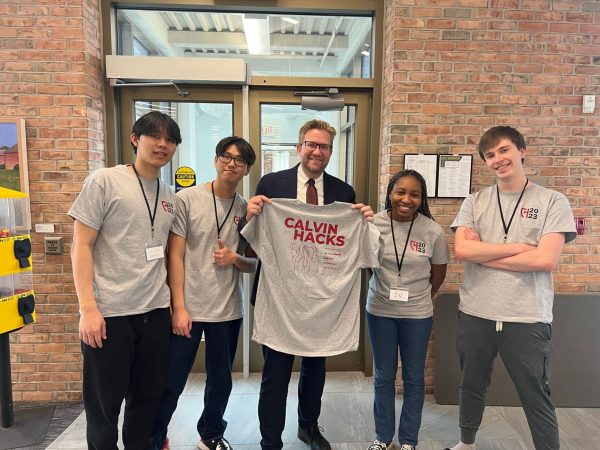Homeowners want to install solar panels. Consumers Energy obstructs them.
Consumers Energy’s policies and regulations create hurdles for homeowners looking to invest in solar energy.
When COVID-19 shut down Calvin’s in-person classes, physics professor Larry Molnar found himself spending more time in his home office than in front of his Calvin computer. The additional time at home made him think about how he could reduce his use of nonrenewable energy.
“We have a really nice south-facing roof, so I decided to look into getting solar panels,” Molnar said.
For solar panels to work well, they must be installed at a particular angle to the sun. In Grand Rapids, architects have designed house roofs at a slant to prevent snow accumulation. Molnar discovered that the optimal angle for preventing snow from accumulating on his roof was the same as for optimal solar energy production at Grand Rapids’ latitude.
“It was perfect for solar panels,” Molnar said. After evaluating the cost of implementing, he discovered that the panels would pay for themselves in about ten years. He installed the panels in November of 2020.
“I’m not going into debt, and I’ll get the money back in ten years. And after that, I get free electricity. It’s definitely doable,” Molnar said.
After installing the panels, Molnar soon discovered that his energy usage was under the amount he produced. Even on cloudy days, when panels produce less energy, he found that his household uses only half of the energy his panels produce.
Consumers Energy, the utility company which produces and distributes energy in West Michigan, then buys the energy Molnar produces and funnels it into the state’s energy grid. However, CE only pays for two-thirds the value of each kilowatt hour of energy Molnar produces.
“[CE] doesn’t allow me to zero out my energy bill,” Molnar said. “They buy it back at two-thirds of its value during the day. They will apply these charges to the energy bill, but not to any other parts of the bill,” Molnar said.
“If I’ve already made my energy, why can’t I buy it back at the full price?”
According to Joshua Paciorek, Consumer Energy’s media relations specialist for West Michigan, the company encourages individuals to buy into the Consumer’s Energy Solar Gardens program. This program costs an additional $9 per month and allows consumers to directly support CE’s investment in solar energy.
“This allows us to spread the cost efficiency to more people who can’t afford to install solar,” Paciorek said. “I’d direct people towards this program if they want to participate in solar energy.”
Notably, the Solar Gardens program requires that individuals pay an additional fee to install solar energy. CE then uses this additional money to invest in solar energy production. In contrast, when an homeowner installs their own solar panels, the homeowner is able to both decrease their own energy bill by using their self-produced energy and make additional money by selling back additional energy to CE.
In addition, according to Molnar, there are significant costs associated with storing and transporting energy from solar farms to places where people use it.
“It’s better for me to use my own energy because I don’t have to transport it. It’s sustainable for my neighbors, too,” Molnar said, noting that his energy can most sustainably be used by the people living closest to him, because less energy is lost in transport.
Sustainability and clean energy are both on Consumer Energy’s radar. According to Paciorek, CE plans to phase out coal energy by 2025 and produce 63 percent of their energy from renewable sources by 2040. Part of this plan has led to the purchase of five additional natural gas-powered plants, which will be phased out by 2040.
Although burning natural gas releases less carbon dioxide into the atmosphere than coal, it is still a nonrenewable fossil fuel.
“I don’t see this effort as very genuine,” Molnar said. “CE doesn’t need to go with natural gas if they’re already able to go with solar. It doesn’t matter if it’s cost effective or not, because the cost is passed along to the consumer, which in the case of CE is the Michigan taxpayer.”
According to Tiana Starks, a representative of Solar King, the state-approved company which installed Molnar’s solar company, the Michigan Public Service Commission governs energy usage in West Michigan by working with CE. Individuals who install solar panels are required to follow the guidelines established by the MPSC.
“The MPSC requires that the energy generated by the system does not exceed the number determined by the previous energy statements and that the utility company provides approval,” Starks said in an email to Chimes.
In Molnar’s case, this meant that, in accordance with Michigan law, he was only allowed to install solar panels on 40 percent of his roof. Even though he wanted to invest in more solar panels, doing so would have resulted in his producing more energy than currently allowed.
“I’m already at 200% production, and it’s 2021, not 2040,” Molnar said. “We could produce twice as much energy. But [CE] doesn’t allow it.”
According to Molnar, CE does not play fairly within the energy usage system. For example, electricity in West Michigan costs 50 percent more on summer weekdays between 2 p.m. and 7 p.m., when air conditioners are running and energy usage is at its highest point in the year.
“It’s this time of year when it’s most expensive for CE to produce energy,” Molnar said. “But that’s exactly when my rooftop solar is doing a really good job.” As such, rooftop solar provides an excellent sustainable energy source, because it produces electricity exactly when it’s most needed. But CE does not pay a higher rate for solar energy produced at the peak summer times, even though they charge more.
“They are using their [state of Michigan-granted] limited monopoly to discourage people from producing their own energy,” Molnar said. “The state has a panel that negotiates with energy companies, because the state has granted them a limited monopoly. But it seems more like the MPSC are supporting the shareholders of CE than the taxpayers of the state of Michigan.”
“The bottom line is, solar energy is still affordable in Michigan,” Molnar said. “But we need to make [it] a level playing field.”











